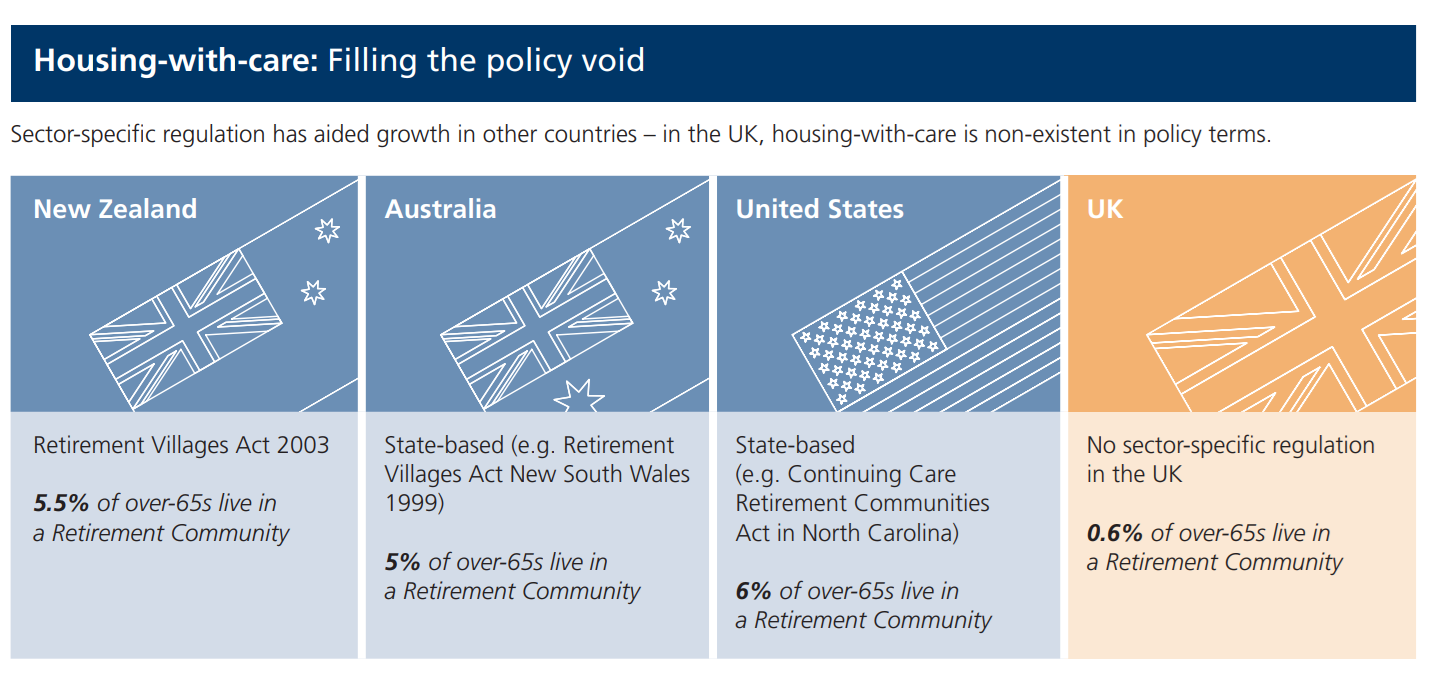
The UK Government has appointed an independent Older People’s Housing Taskforce to look at options for the provision of greater choice, quality and security of housing for older people.
The Taskforce was formally launched on 17 May 2023.
ARCO was heavily involved in the creation of the Taskforce, having first called for a taskforce on older people’s housing to be created in February 2020.
ARCO spearheaded a three-year long campaign, which included recruiting parliamentary supporters for Integrated Retirement Communities, launching a Housing-with-Care Grey Paper with politicians from four different parties and campaigners, and drafting an open letter to the Prime Minister on making the UK a world leader in housing-with-care, signed by MPs, industry and charities.
In July 2021, this campaigning culminated in the UK Parliament’s first ever debate on Housing-with-Care, bringing the need for a Taskforce directly to the floor of Parliament.
Just over half a year later in February 2022, the Government announced the formation of a Taskforce on Older People’s Housing in its Levelling Up White Paper, a victory for two years of campaigning.
The Taskforce was formally launched in May 2023 jointly by two government departments: the Department of Health and Social Care (DHSC) and the Department for Levelling Up, Housing and Communities (DLUHC).
Aims and Objectives of the Taskforce
The aim of the Taskforce is to look at options for the provision of greater choice, quality and security of housing for older people. The Taskforce will look at ways to increase supply and improving the housing options for older people in later life, and to explore ways of overcoming any challenges.
The Taskforce focuses on public and private specialised and supported older people’s housing; its scope does not include care homes. The Taskforce will run for up to 12 months and will produce an independent report to DLUHC and DHSC.
During ARCO’s 2023 Annual Conference, we were delighted to welcome Professor Julienne Meyer CBE, Chair of the Taskforce, where she unveiled two early recommendations of the Taskforce which ARCO strongly supports:
-
The Government should protect consumers from hidden event fees, as soon as possible, based on recommendations developed by the Law Commission in 2017
-
The Government should ensure older people’s housing is given due consideration and prominence in the forthcoming revisions of the National Planning Policy Framework.
Full recommendations will be formulated following the closure of the Taskforce’s call for evidence in September.
Further information on the Taskforce, including its membership, can be found on the Government’s website here.
Our sector’s vision is for 250,000 people to live in housing with care by 2030, which would result in turnover of over £70bn and £5.6bn in savings for the NHS and social care.
But to achieve this we need to act now. By exploring potential areas for change, including sector-specific legislation on fees and regulation, clarity in the planning system, and new tenure models, the Task Force would help propel the sector closer to the levels of provision seen in other countries – where the legal and regulatory framework is much stronger.
Why does it need to be cross-government?
The Housing-with-Care sector cuts across numerous Government departments. For example, care regulation and market shaping is centred in the Department of Health and Social Care (DHSC), while planning guidance and tenure reform is the remit of the Ministry for Housing, Communities and Local Government (MHCLG). At the same time, consumer protection and regulation sits with the Department for Business, Energy & Industrial Strategy (BEIS). Unleashing the Housing-with-Care sector will require cross-government collaboration, bringing together different policy areas, and boosting a sector complementing the current social care landscape of care homes and domiciliary care.
What policy proposals need to be looked at?
There are three key areas for reform that need to be examined by the Task Force, with clear policy solutions developed for each. These are:
-
Sector-specific legislation: The lack of sector-specific legislation for Housing-with-Care results in less protection for consumers and uncertainty for operators. ARCO recommends that the Law Commission’s proposals for sector-specific legislation on fees and regulation are implemented. In addition, given that the leasehold system is not ideally suited to the expansion of Housing-with-Care, specific tenure models need to be developed which focus on services and operation.
-
Clarity in the planning system: It is currently much harder to build Housing-with-Care than care homes due to a lack of definition in the planning system. This needs to change through clear definition and categorisation of Housing-with-Care.
-
Funding options for affordable Housing-with-Care provision: While the majority of customers in the Housing-with-Care sector will have access to housing equity to be able to fund their move into a Housing-with-Care community, it is essential that the model remains an option suitable for all older people, regardless of their means or housing wealth.
